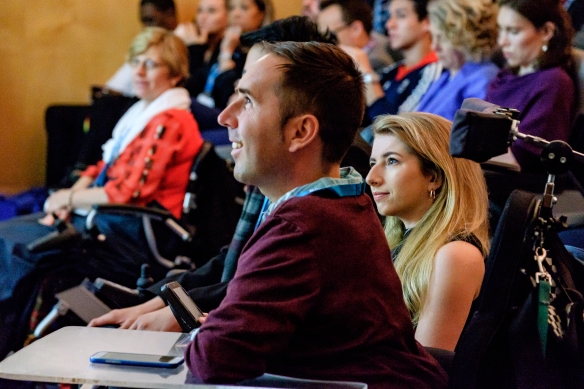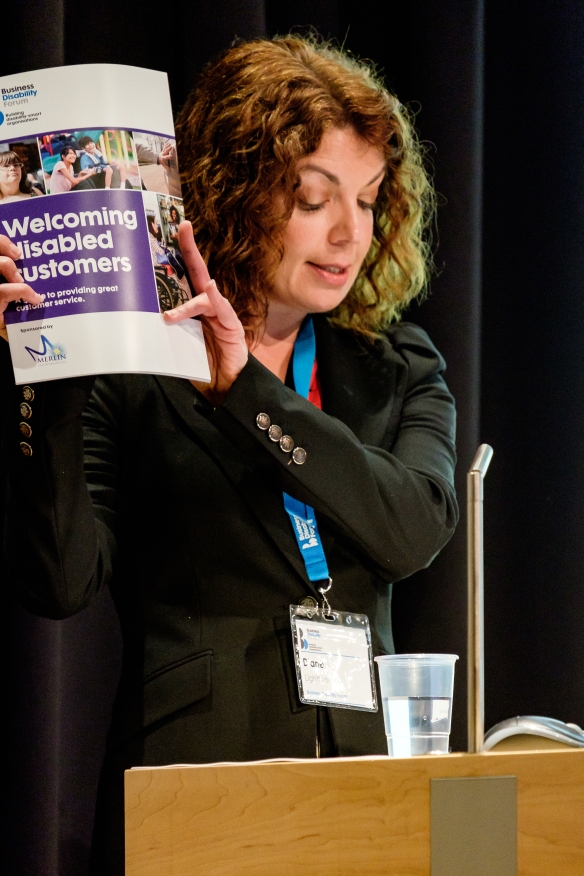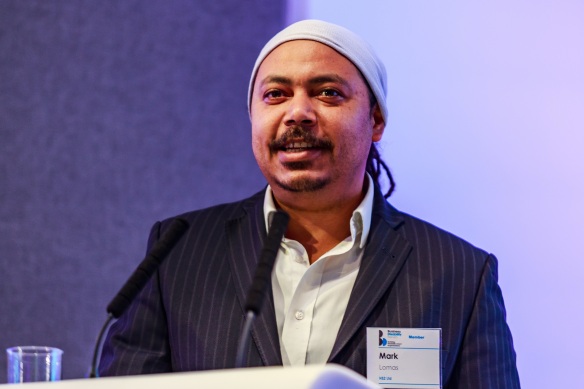Diane Lightfoot, CEO of Business Disability Forum
On Thursday 25 April, we were delighted to host our annual conference 2019: Disability leading the way.
When we chose this theme, we wanted to reflect the importance of leadership in driving change. But you don’t have to be senior to be a leader and so we also wanted to reflect the importance of leadership not just at senior level but through all levels of the organisation.

Caroline Casey and guests
We support businesses to become “Disability-Smart” via our own Disability Standard which is a whole-organisation accreditation and which reflects our ethos that getting it right for disabled people is not just the domain of HR or D&I but needs a cross business commitment to getting it right. So it’s no surprise that a key area of the Standard – “Know how” is all about the confidence of line managers – in being confident to have a conversation with a disabled employee and to know how to respond to requests for support – including adjustments – and indeed this was a recurring theme in our Great big workplace adjustments survey. It’s also about the confidence of customer facing staff to meet the needs of everyone.
Too often, disability is parked in the “too difficult” or “too sensitive” box – and in too many cases, the fear of getting it wrong means that people don’t do anything as they are so worried about causing offence. This might mean being afraid to ask a disabled colleague what adjustment they might need for a meeting or pretending not to see a disabled customer – something which people with a visual impairment tell us happens all too often.

Welcoming disabled customers guide
So in March with support from our member Merlin, we launched our new Welcoming disabled customers guide which is full of really practical hints and tips for frontline staff on how to communicate with and provide excellent support to every customer. The spending power of disabled people in the UK is around £249 billion per year and rising. This means that quite apart from being the right thing to do as an ethical retailer, it makes good business sense to provide services, premises and websites that are both accessible and usable for the widest possible group of customers. Businesses who instil the confidence in their people to be disability smart and ask how to best serve all their customers stand to reap considerable business benefits. Yet disabled customers more often than any other experience poor customer service. The Extra Costs Commission 2014 found that three quarters (75%) of disabled people and their families had left a shop or business because of poor disability awareness or understanding. This is entirely unnecessary as often all that is needed is to ask “how can I help?”.

Attendees at Business Disability Forum Annual Conference 2019, 25 April 2019, hosted by the British Library
And at the conference I was delighted to launch our Meetings matter guide as a really practical tool to make meetings a positive, productive and – dare I say – pleasurable experience for all involved. Millions of meetings take place every day – from work team meetings and organisational away days to stakeholder or client consultations and meetings that can decide the future and the lives of the people affected. For too many disabled people, however, meetings are frustrating experiences in which they can never fully participate because often simple adjustments have not been made by the meeting organiser or chairperson. Adjustments aren’t a “nice to have”; they are absolutely essential for disabled people who might otherwise leave a meeting with incomplete or inaccurate information or simply not be able to attend at all.

Meetings matter guide
As we often say, if you get things right for disabled people, you get them right for everyone. Accessible meetings mean more productive meetings for everyone.

Change in our time? Leaders of today panel with Asif Sadiq ME, Mike Clarke, Caroline Casey, Victoria Cleland, Mike Clarke and Brian Heyworth.
You can also lead by making a difference wherever you work in an organisation and whatever your position in society. One way to show leadership is to speak out and say what other people are often to afraid or embarrassed to talk about and thereby break down barriers and challenge taboos. Our session “breaking down barriers” aimed to shine a light on less understood conditions – and those which are perhaps deemed less socially acceptable to talk about – but which have a real impact on people’s working lives. If you would like more indepth information on specific conditions, take a look at our updated and expanded briefings series – developed in partnership with expert organisations and providing practical guidance on disability as it affects business.
Because this is what we do at Business Disability Forum. We create a safe space to talk to business and for businesses to talk to each other about disability and we enable pragmatic, scalable business solutions.




















